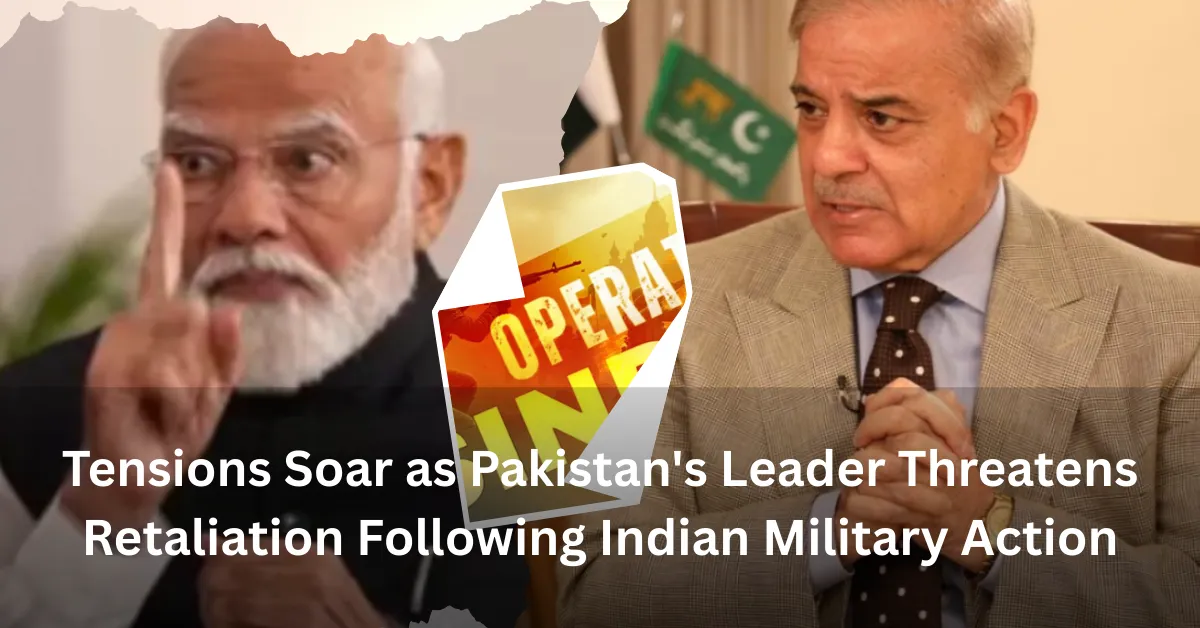Tensions Soar as Pakistan’s Leader Threatens Retaliation Following Indian Military Action
In a dramatic televised address late on May 7, 2025, Pakistani Prime Minister Shehbaz Sharif delivered a stern warning to India, accusing the nation of a “grave mistake” and declaring they would “pay the price.” This escalation follows India’s missile strikes earlier that day on Pakistani territory and Pakistan-administered Kashmir, which, according to Al Jazeera, resulted in at least 31 deaths. India launched these strikes in response to a militant attack in April 2025 that killed 25 Indian tourists and a guide in Indian-administered Kashmir, an attack India attributes to Pakistan-based terrorist groups.
Rapidly Escalating Tensions
The fragile peace between India and Pakistan was shattered in the early hours of May 7th when Indian forces carried out precision strikes on nine locations across Pakistan-administered Kashmir and Punjab Province. Notably, Punjab is outside the contested Kashmir territory, marking a significant escalation. The Indian government characterized these actions as targeting “terrorist infrastructure,” asserting they had “clear evidence” of Pakistan’s involvement in the April attack. However, Pakistani military officials reported that the strikes caused at least eight deaths and 35 injuries in Punjab alone, with additional casualties in Kashmir, labeling the action an “act of war.”
Sharif’s address, broadcast on 24 News HD, was resolute. Flanked by Pakistani flags and the emblem of the Prime Minister’s Office, he announced that the country’s armed forces had been authorized to take “corresponding actions” in response to India’s aggression. While the specifics of Pakistan’s planned retaliation remain undisclosed, the rhetoric signals a dangerous escalation in a region long considered a potential nuclear flashpoint.
Historical Context: The Kashmir Dispute
The core of this ongoing conflict is the decades-long dispute over Kashmir, a Himalayan region claimed by both India and Pakistan since their partition in 1947. The two nations have fought three wars over this territory, with frequent skirmishes and cross-border attacks. Tensions have been particularly acute since 2019, when India revoked the special autonomous status of Jammu and Kashmir, a move Pakistan condemned as illegal. Since then, the region has experienced increased militant activity, with India consistently accusing Pakistan of harboring and supporting terrorist groups, a charge Pakistan denies.
The April 2025 attack on Indian tourists in Kashmir, which India blames on Pakistan-based militants, appears to have been the immediate cause for the latest military action. India’s decision to strike targets in Punjab, outside the disputed Kashmir region, represents a major escalation, as previous retaliatory actions have largely been confined to the Line of Control (LoC) that divides Kashmir.
Regional and Global Implications
These renewed hostilities occur at a particularly vulnerable time for Pakistan, which is already grappling with a fragile economy. In September 2024, the International Monetary Fund (IMF) approved a $7 billion loan to Pakistan—its 23rd such bailout since 1958—aimed at stabilizing its $350 billion economy. However, the ongoing conflict with India could severely undermine these efforts, potentially disrupting trade, deterring foreign investment, and exacerbating Pakistan’s economic challenges. Sharif himself had previously hailed the IMF bailout as a “major step forward” for economic stability, but the current crisis threatens to reverse those gains.
On a global scale, the situation has triggered alarm. The Council on Foreign Relations has long identified the India-Pakistan border as a potential nuclear flashpoint, given that both nations possess nuclear weapons. Declassified U.S. intelligence reports from the 1980s and 1990s, recently brought to light by the National Security Archive, warned of the risk of nuclear escalation during crises between the two countries, especially if military leaders on either side adopt “hair-trigger responses.” While the likelihood of a full-scale war remains uncertain, the potential for miscalculation is significant.
Social Media and International Reactions
The X post by BRICS News, which initially reported Sharif’s statement, sparked a wave of reactions online. Some users expressed deep concern about the escalating conflict. For example, @NematShaikh9 urged both nations to de-escalate to prevent “bad consequences” for innocent civilians and their economies. Others, such as @WillGrn24, criticized Pakistan’s stance, pointing to its alleged role in the initial terrorist attack that triggered India’s response. Meanwhile, @zubic_eth shared a meme from Breaking Bad, humorously capturing India’s presumed reaction to Pakistan’s threats, reflecting a mix of unease and defiance.
Internationally, the strikes have garnered attention, but concrete action has been limited thus far. Reuters reported that Pakistan has vowed to target Indian military installations in retaliation, though no such actions have been confirmed at the time of this report. The international community, including the United Nations, has yet to issue a formal statement, but calls for restraint are expected as the situation develops.
The Urgent Need for Dialogue
The current crisis highlights the urgent need for dialogue between India and Pakistan. However, deep-seated mutual distrust and domestic political pressures make this a formidable challenge. India’s government, under Prime Minister Narendra Modi, has adopted a strong stance on national security, particularly following the April attack, which ignited significant public outrage. In Pakistan, Sharif faces intense pressure to respond decisively to what many in the country perceive as an unprovoked act of aggression, even as his administration grapples with serious economic challenges.
For the moment, the region remains on edge, with the looming threat of further violence—and potentially catastrophic escalation—casting a shadow over South Asia. As @meltec_mel1124 aptly commented on X, “Oof, this ain’t lookin’ good. Buckle up, folks.”
JUST IN: Pakistani Prime Minister Sharif says India made a “grave mistake for which it must now pay the price.” pic.twitter.com/Y6MQeUQvrt
— BRICS News (@BRICSinfo) May 7, 2025

